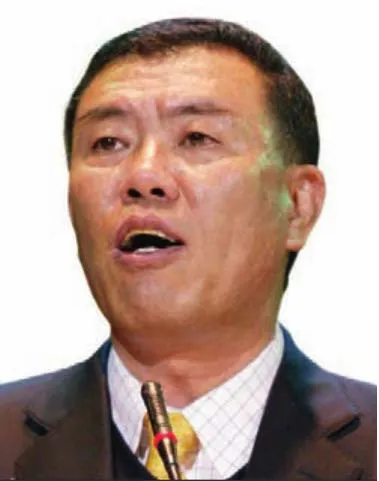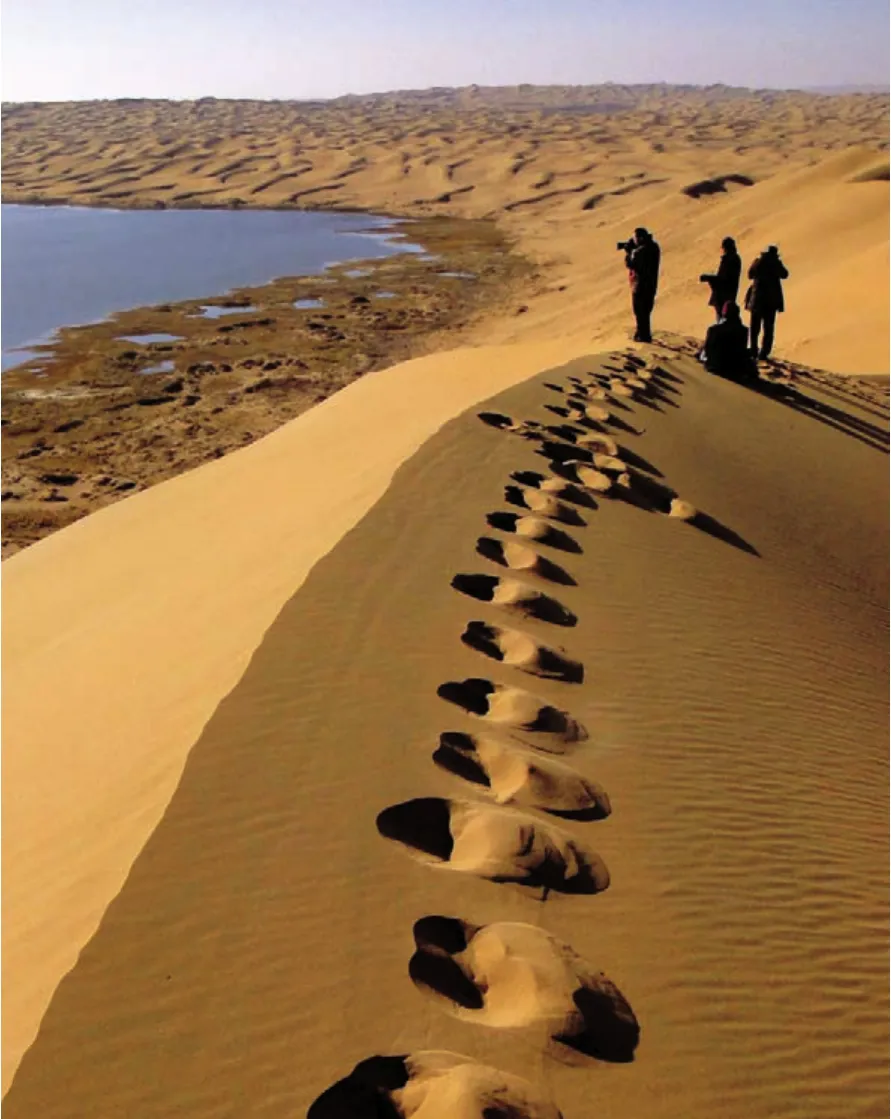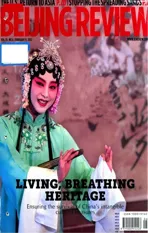Green Capitalists
2012-10-16EntrepreneursworktocurbenvironmentaldegradationthroughcivilsocietyorganizationByLiLi
Entrepreneurs work to curb environmental degradation through a civil society organization By Li Li
Green Capitalists
Entrepreneurs work to curb environmental degradation through a civil society organization By Li Li
Chinese business leaders are playing a leading role in the country’s environmental conservation efforts,according to China’s Southern Media Group,the publisher of popularSouthern Weekendnewspaper.
On December 10, 2011, the media group based in Guangzhou, Guangdong Province,presented its “China Dream” award to the Society of Entrepreneurs and Ecology(SEE), a 7-year-old non-governmental organization (NGO) founded by nearly 100 like-minded entrepreneurs, committed to reducing the frequency of sandstorms in China’s arid north.
Receiving the trophy on the stage of the presentation ceremony were Feng Lun,current Chairman of SEE and Chairman of Vantone Holdings Co. Ltd., and Ren Zhiqiang, Director of SEE’s Constitution Committee and former Chairman of Huayuan Group.
Founded in 2004, SEE was initially criticized for being little more than a show put on by the country’s nouveau rich. However,over time SEE’s success in slowing desertification in north China’s Inner Mongolia Autonomous Region has become clear and the organization’s transparency and democratic structure have won widespread praise from the local NGO community. Currently,the membership-based society has 185 members.
“SEE is a school where Chinese entrepreneurs learn how to participate in environmental and charitable causes. I have learned so much from its development process,” said Wang Shi, SEE’s Chairman from 2007 to 2009 and Chairman of Vanke Co.Ltd., one of China’s largest residential real estate developers.
Total devotion
In October 2003, Liu Xiaoguang, who manages one of the largest real estate development companies on the Chinese mainland, the Beijing Capital Group, visited a holiday resort deep in the desert in Alxa League, which comprises the western part of Inner Mongolia.Alxa is home to several large deserts, including the Badain Jaran Desert, the fourth largest desert in the world.

LEADING CAMPAIGNER:Liu Xiaoguang, the founding Chairman of SEE
As a result of extensive deforestation, particularly the felling of saksaul trees, one of only a few tree species able to survive in the region’s sandy desert soils, and overgrazing, the deserts in Alxa were growing by over 1,000 square km a year. Sand from these deserts frequently traveled more than 1,000 km covering the skies of Beijing and other East Asian cities.
Awed by the view of endless dunes, Liu decided to use his resources to put a stop to deserti fi cation and increasingly frequent sandstorms.
On June 5, 2004, World Environment Day, the 100 Chinese entrepreneurs who initially agreed to join Liu on his mission to stop spreading sands gathered at Alxa’s Moon Lake to officially establish SEE. Liu was elected fi rst chairman of the organization.
The participants committed themselves to containing sandstorms and rehabilitating the environment in Alxa and promised to each donate 100,000 yuan ($15,866) to the campaign every year for 10 successive years.
While focusing primarily on preventing or reducing sandstorms originating in Alxa,SEE has also worked to promote communitybased integrated development solutions to the problem of desertification. Part of the organization’s strategy involves improving local farmers’ living standards by integrating conservation strategies with ecological, social,and economic bene fi ts.
Crucially, SEE has prompted Chinese entrepreneurs to assume more social and environmental responsibility and play a direct role in sustainable development.
SEE has evolved over the years from trying to implement its own projects, such as planting trees in the desert, toward acting as a foundation and discussion group for nongovernmental conservation efforts. It adopts a human-oriented approach, which aims to


LI XIN
(Left) TRANSFORMED LANDSCAPES:Campaigns to seed new pastures in Alxa’s mountainous areas over the past two decades have slowed down the growth of deserts by fi xing sand dunes
A VISUAL FEAST:The Tengger Desert in Alxa, Inner Mongolia Autonomous Region, is a major source of the sandstorms that plague north China in spring allow the recovery of local saksaul forests and pastures by adapting local farmers’ lifestyles to reduce deforestation and overgrazing.
Since its establishment, SEE has spent more than 3.3 million yuan ($523,593) to fi nance 13 scienti fi c fi eld studies on local deserti fi cation prevention and invested nearly 19 million yuan ($3.01 million) in eco-friendly livelihood projects in 15 villages.
These efforts have resulted in the conservation of 49,333 hectares of pastures, 165,333 hectares of saksaul forests and 4.65 million cubic meters of water.
The organization has also established a local volunteer team of more than 100 members, published a series of brochures on native flora and fauna and filmed a documentary recording Alxa’s biodiversity.
In 2008, SEE organized a study trip to the United States for 19 of its members. During the 10-day trip, the delegation visited 15 NGOs, including the Hewlett Foundation,Rockefeller Foundation, Ford Foundation and The Nature Conservancy (TNC).
“When I fi rst went to the United States 14 years ago, it was to learn how to make money.This time, I went to learn how to spend money for the environment,” said Vanke’s Wang,who took part in the trip.
At the end of the year, SEE set up a foundation, which has provided 8.7 million yuan($1.38 million) to 64 environmental projects that embrace SEE’s agenda and are committed to the principles of “cooperation” and“win-win” solutions.
Since 2005, SEE has cooperated with TNC, a charitable environmental organization that works to preserve the plants, animals,and natural communities, to give out SEETNC Ecological Awards to conservationists,reporters, lawyers and NGOs that have made outstanding contributions to environmental protection. More than 100 organizations and individuals have so far received monetary prizes totaling 3.6 million yuan ($571,175).
SEE also sponsors a “green leadership”training program, which has so far bene fi ted 57 environmental NGO leaders from 30 organizations. Another training program designed for college environmental groups attracted 708 trainees from 94 campus groups.
“The financial resources we have mobilized are far too small to control desertifi cation in China. SEE’s role is mainly as an organizer of awareness campaigns and source of seed money while the majority of invest-ment comes from the government,” Ren said.“The ideal situation is that NGOs, the government and people threatened by deserti fi cation pool their resources and work together.”
Green awakening
According toChina Youth Daily, Liu made more than 100 calls to his fellow business executives to recruit members during SEE’s preparatory stage. Many of the organization’s founding members were badgered into joining the cause by Liu or Liu’s friends. SEE’s founding members, some of whom were from Singapore and China’s Hong Kong and Taiwan, managed assets totaling 2 trillion yuan ($317.31 billion).
While some joined the organization out of their genuine concern for China’s environmental conditions and the limits that the country’s polluted air and water, degraded soils and dammed rivers would place on its economy, others regarded membership as simply a golden opportunity to network.
“You cannot blame those people,” said Yang Peng, former Secretary General of SEE.“It wasn’t meant to be a club of saints. Those who cannot identify with its core tenets will leave eventually.”
Yang, who was an official with the Ministry of Environmental Protection before working for SEE, said joining SEE also helped some billionaire members change their lifestyles. Yang himself gave up wearing cashmere clothing after he learned that one cashmere sweater requires the wool from 10 goats, which need to feed on 66.7 hectares of pasture.
Zhang Yue, an active SEE member and Chief Executive Officer of Broad Air Conditioning based in Changsha, Hunan Province, with a personal fortune estimated at $850 million in 2010, gave up traveling in his private jets in 2005 after reading that the carbon dioxide emitted during a 3,000-km trip by a private jet is equivalent to the amount of carbon dioxide absorbed by eight large trees over 60 years.
Zhang also purchased the copyright for the Chinese version ofHow Much Is Enough, a book on the detrimental effects of consumption and consumer behavior on the world’s natural environment, and had it printed. He strongly recommended the book to his fellow SEE members, but never gave a copy away easily. “I only give the book to those with a strong desire to read it. Otherwise, the 700-page book, whose paper consumes a full-grown tree, would be wasted,” Zhang said.
Yang said all SEE members had signed a pledge to stop eating shark’s fi n, a traditional delicacy, or sending or receiving it as a gift.
“We Chinese entrepreneurs are willing to work together with our peers, governments and civil society groups from around the globe to embrace sustainable development and take responsibility for the welfare of future generations,” Vanke’s Wang read an announcement on behalf of members of SEE and four other Chinese NGOs at a forum during the UN Climate Change Conference in Copenhagen, Denmark, in December 2009.
Equality and democracy
Liu, who led the efforts to kick-start SEE,never expected that making decisions would be so dif fi cult for an organization consisting of key corporate decision-makers.
At SEE’s fi rst general assembly meeting,when Liu, head of the preparatory committee,asked participants to cast ballots on the founding charter his committee had drafted, he was immediately overwhelmed by questions over its contents.
To end the deadlock, someone suggested casting votes to decide whether the charter could be approved in principle. However,Charles Zhang, founder, CEO and President of Sohu.com, a leading Chinese Web portal,stood up and said that “approved in principle”should be clearly de fi ned.
Then some people suggested casting ballots on the draft clause by clause. But Zhang stood up again to question whether a simple majority in favor of a clause was enough to have it rati fi ed.
Eventually, the draft was adopted after consensus was reached that the charter was open to revisions in the future.
An even bigger argument erupted when Liu asked the participants to cast votes on a shortlist of 15 nominated board directors. The authority and basis for the shortlist were immediately questioned.
“Like all of us, you also contribute 100,000 yuan as membership fee, not one penny more. Then why on earth should we listen to what you say?” said Wu Kegang,President of a wine company, addressing Liu.
At last, Liu was forced to give up the list and participants started to nominate new candidates, a process that lasted till midnight.
However, while he lamented the time he wasted “selecting” candidates for the board

CFP

CFP
(Left) EFFICIENCY MONITORING: Zhang Rongfa(left), a SEE project of fi cer,visits a goat farmer in Alxa to assess the impact of a project carried out by SEE
GREEN RECOGNITION: Feng Lun (left), SEE Chairman,and Ren Zhiqiang (center),Director of SEE’s Constitution Committee at the “China Dream” awards ceremony on December 10, 2011 of directors, Liu realized that democracy had been woven into the fabric of SEE.
After Liu was voted SEE’s fi rst chairman following an anonymous ballot, he became determined to unite this group of entrepreneurs with a stable and democratic decisionmaking process.
As a result of extensive discussions and compromises, SEE’s governance structure,with a board of directors, a supervisory board and a constitution committee at its core, took shape. Supervisors are in charge of supervising the performance of the board of directors while the constitution committee is in charge of recommending amendments to the charter at members’ general assembly meetings.Members, who each possess one ballot in leadership elections, can also run for any leadership position. Each member can only be entrusted to cast the vote of one absent member. The charter stipulates that chairmen or chairwomen cannot serve two terms in a row.
“I ran for a place on the supervisory committee three times and failed the fi rst two times,which is quite common in SEE,” Ren said.
It has become customary for each candidate to clearly state how many days they can work for SEE full time during their terms in their campaign speeches. Ordinary members are also required to participate in field research and the evaluation of projects sponsored by SEE.
Mark Han Jia-hwan, Executive Director and Chairman of Taiwan-based DaChan Food(Asia) Ltd. and SEE’s Chairman from 2009 to 2011, visited Alxa and investigated the Ulan Buh Desert and the Tengger Desert, even though he was on crutches due to polio. “My chicken-filled brain has to make half of its room for deserts now,” said Han after his election in 2009. His company is a major chicken supplier for KFC and McDonald’s in China.
Talking about the advantages and disadvantages of democratic decision-making in SEE at a seminar after the “China Dream”awards ceremony, Feng said while decisions yielded by a democratic participative style score between 60 and 80 on a 0-to-100 scale of ef fi cacy, dictatorship yields results that can be graded 99 or 0.
“By opting for democracy, we may not always make the best decisions but we avoid making the worst decisions,” Feng said.
